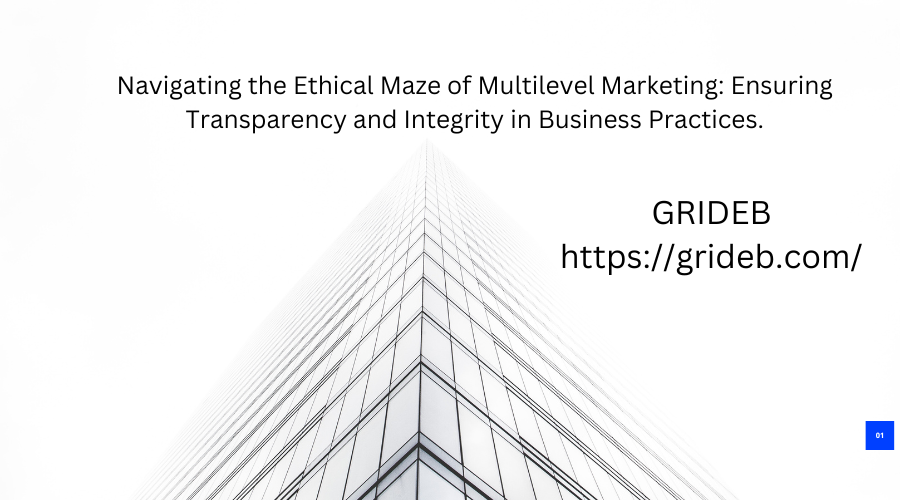Navigating the Ethical Maze of Multilevel Marketing: Ensuring Transparency and Integrity in Business

Multilevel marketing (MLM) is a business model that has been both praised for its potential to empower individuals and criticized for its potential to exploit them. At the heart of this debate are ethical considerations that must be carefully navigated by businesses and entrepreneurs. In this blog, we will explore the ethical considerations involved in MLM and discuss strategies for ensuring transparency and integrity in business practices.
Understanding Multilevel Marketing:
At its core, MLM is a business model that relies on a network of distributors to sell products or services. Distributors earn commissions not only for their own sales but also for the sales made by the distributors they recruit. This creates a hierarchical structure where distributors can earn income not only from their own efforts but also from the efforts of those they recruit.
Ethical Considerations:
- Transparency: One of the key ethical considerations in MLM is transparency. Distributors and companies must be transparent about the products or services being sold, the compensation structure, and the potential risks involved. This includes providing clear and accurate information about the products or services, the costs involved, and the potential income that can be earned.
- Integrity: Integrity is another important ethical consideration in MLM. Distributors and companies must act with honesty and integrity in all their dealings. This includes being honest about the potential risks and challenges of the business, providing accurate information to customers and distributors, and not making false or misleading claims about the products or services being sold.
- Fairness: Fairness is also a key ethical consideration in MLM. Distributors and companies must treat all distributors fairly and equally, regardless of their level in the hierarchy. This includes providing equal opportunities for all distributors to succeed, ensuring that the compensation structure is fair and equitable, and not favoring certain distributors over others.
- Respect: Respect for others is another important ethical consideration in MLM. Distributors and companies must respect the rights and dignity of all individuals, including customers, distributors, and competitors. This includes treating others with respect and dignity, respecting their privacy and confidentiality, and not engaging in unethical or illegal practices.
Ensuring Transparency and Integrity:
- Clear Policies and Procedures: One way to ensure transparency and integrity in MLM is to have clear policies and procedures in place. This includes having clear guidelines for distributors on how to sell products or services, how to recruit new distributors, and how to earn commissions. It also includes having clear guidelines for the company on how to handle complaints, disputes, and ethical issues.
- Training and Education: Another way to ensure transparency and integrity in MLM is to provide training and education to distributors. This includes training on the products or services being sold, the compensation structure, and the potential risks and challenges of the business. It also includes education on ethical issues and how to handle them.
- Monitoring and Enforcement: Monitoring and enforcement are also important in ensuring transparency and integrity in MLM. This includes monitoring distributors' compliance with company policies and procedures, monitoring their sales and recruitment activities, and enforcing disciplinary action when necessary. It also includes monitoring the company's compliance with legal and ethical standards and taking action when necessary.
- Open Communication: Open communication is also important in ensuring transparency and integrity in MLM. This includes encouraging open and honest communication between distributors and the company, providing channels for distributors to raise concerns and ask questions, and being transparent about the company's policies, procedures, and decisions.
Conclusion:
In conclusion, multilevel marketing is a business model that has both potential benefits and potential risks. Ethical considerations are at the heart of this debate, and it is important for businesses and entrepreneurs to carefully navigate these considerations. By ensuring transparency and integrity in business practices, companies can build trust with their distributors and customers and create a sustainable and ethical business model.